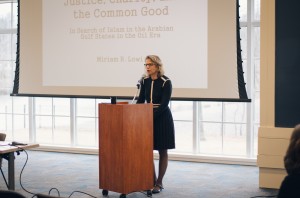While the Middle East may sometimes have the reputation of being a land committed to religious ideology, a political science professor at the College, Miriam Lowi, presented research findings juxtaposing Islamic religious morals found in the Quran regarding distribution of wealth and resources and the concentration of Middle Eastern wealth.
Lowi spent five months in four different Arab countries and presented her findings Wednesday, March 6 in the Education Building.

Lowi examined Oman, Quatar, Saudi Arabia and Kuwait to consider the distributive services of the government, how Muslim constituencies evaluate government behavior, and how society responds to large amounts of oil financing.
The results of these are especially interesting because of many of the distributive values taught in the Quran.
In the Quran, it is taught that fire, water and pastoral land are shared by the community. More importantly, it teaches that all wealth and property belong to God and that people are God’s trustees. Property is meant to be used as God’s property for the betterment of humanity, private property is recognized with the understanding that the owner is a trustee of the property and people must use it for their own betterment as well as others, according to Lowi. It is also preferred that Muslims give anonymously.
In practice, nationals of the countries are given free education and health care, university students receive a monthly allowance for going to school, and all nationals are guaranteed a plot of land in a certain dimension, according to Lowi.
However, according to Lowi, the monthly allowance is distributed to all students regardless of their family wealth, Saudi nationals are often turned away from collecting their plot because there are no more plots left and in Qatar the plots are of unequal dimension. Also, 70 percent of the Saudi Coastline was given by a former king to just five princes and 80 percent of the Saudi population rent land rather than own it despite their “right” to a plot of land.
Furthermore, many residents of these countries are not classified as nationals, and, thus, don’t receive the benefits of one.
According to Lowi, Kuwait is constituted of 80 percent foreigners and Saudi Arabia has hundreds of thousands of Muslims who are considered to be non-nationals. These non-nationals endure terrible living conditions and do not benefit from the distributive systems.
Also, there is a blurring of distinction between public and private funds to use charity as a means of securing allegiance. When rulers don’t use anonymity, the act of giving includes the expectation of a debt and political benevolence, according to Lowi.
Lowi identified the most productive charities as those that don’t give handouts, but instead lend money to poor women who have a plan for a small business project to increase productivity.
Lowi believes her findings highlight the tension between states that don’t practice embedded values. She believes two factors are at blame for this, the autocratic political structure and an economic structure where revenues from vast oil and gas reserves fall into leaders’ hands and cause a deep sense of entitlement and irresponsibility.






